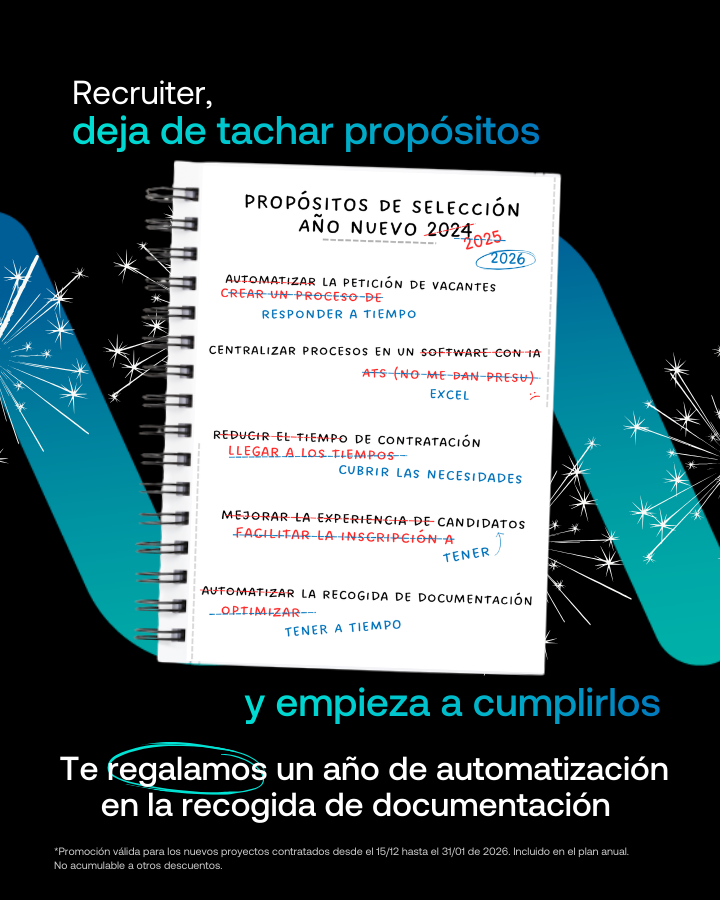Supermarket Recruiting
.jpg)
The supermarket sector is one of the most dynamic and essential in our daily lives. From the cashier who greets you with a smile to the replenisher that ensures that your favorite products are never missing, all of them are key parts of the mechanism that keeps this sector working. But, How do supermarkets face the challenges of finding and managing talent in such a changing environment?
The current talent situation in supermarkets
Supermarkets are companies with a high turnover of staff, the turnover rate can be up to 60% per yearl. This means that Human Resources departments are constantly looking for new talent to fill vacancies.

Main challenges in finding employees:
- High staff turnover: High turnover is a persistent problem. Not only does it involve additional costs in terms of time and money for hiring and training, but it also affects team morale and the consistency of customer service.
- Find the right profile: Supermarkets seek a combination of soft and technical skills in their employees. The ability to handle stress, provide customer service, and work efficiently are crucial. Identifying these talents in a sea of candidates can feel like searching for a needle in a haystack. The multilevel assessment functionality ensures that candidates meet the previously established requirements, evaluating both technical skills and soft skills, and ensuring the selection of the most suitable profile for the role.
- Long and costly selection processes: Traditional selection processes, including resume review, phone and in-person interviews, can be slow and expensive. This is especially problematic when you need to fill positions quickly.

How to deal with recruitment challenges?
As in all processes, there are a series of steps that, although they do not ensure success, help to reduce the chances of error.
First of all, before even starting the selection process, it is essential to prepare the vacancy well:
Drafting of the offer: A good job offer must be clear and concise. It should include a detailed description of the position, responsibilities, requirements and desired skills. In addition, it is important to highlight what makes the company attractive, such as benefits, opportunities for growth and the work environment.
Posting on efficient platforms: Not all job portals are equally effective. It is crucial to identify which ones are most frequented by the candidates you are looking for and which have yielded the best results in previous recruitment processes. With the AI-driven Multiposting solution, you save time when posting your job offer across different platforms, allowing you to focus on what matters most: ensuring your vacancy reaches the portals that attract the highest quality and most relevant candidates, something that can also be achieved through Data Analytics.
Establish clear requirements and tasks: To avoid misunderstandings and ensure that candidates understand what is expected of them, it is essential to clearly define requirements and tasks. This also helps candidates to self-evaluate and decide if they are suitable for the position, thus reducing the number of non-relevant applications.
Once the vacancy is posted, there are also strategies that help reduce the error rate:
Develop a structured selection process: Having a well-defined process can make selection more efficient. This includes having interview guidelines, clear evaluation criteria, and standard procedures for all stages of the process.
Training and continuous development: Investing in training current employees can reduce turnover, as they feel valued and see opportunities for growth within the company.
Referral programs: Encouraging current employees to recommend candidates can be an effective way to find quality talent. Employees are aware of the company's culture and needs and can identify people who are a good fit.

HR automation for supermarkets
Finally, we cannot ignore the positive impact that technology can have on these processes. Automation not only speeds up the selection process, but it also improves the quality of hiring. According to a Deloitte study, companies that adopt automation in their selection processes see a 30% reduction in hiring time and a 25% increase in the quality of hired candidates.
This is where tools such as recruitment chatbots come into play:
- Recruiting chatbots: Chatbots are available 24 hours a day, 365 days a year, which means that candidates have access to do their first interview at any time. In this way, recruiters receive a greater number of applications (already evaluated) without having to spend direct effort on it.
- Efficient candidate filtering: Chatbots conduct initial interviews, asking key questions and evaluating answers in real time. This allows Human Resources teams to focus on more advanced stages of the process with pre-selected and more promising candidates.
- Automatic interview scheduling: Coordinating schedules can be a nightmare, especially when you have dozens of candidates. Automation tools can manage this effortlessly, sending reminders and rescheduling as needed.
- Candidate feedback: Candidates need to be informed about their progress in the selection process, but answering each one manually can be a daunting task. With recruitment chatbots, it is possible to provide automatic and personalized responses to each candidate the moment they request it, improving their experience and keeping them informed in a timely manner.
- Reports and statistics. The automation of the selection process makes it possible to collect all the relevant information, making it easier to identify possible areas for improvement. This allows Human Resources professionals to make decisions based on data, continuously optimizing the selection process and ensuring efficiency and effectiveness in talent management.

Managing talent in supermarkets presents unique and significant challenges, but with the right tools, these challenges can be effectively overcome.
The adoption of technology in selection processes can significantly speed up and improve the search for personnel, allowing Human Resources teams to focus on what really matters: finding and retaining the best talent.
.jpg)
Fulfill your selection purposes
Recruiter, fulfill your recruitment purposes in 2026 with the help of Velora. And as a gift, a free year on automatic document request.

Related articles
More articles to inspire your HR strategy









